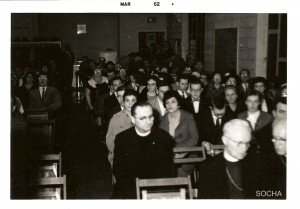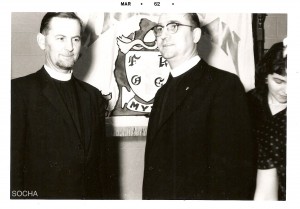Recently, I was alerted to several photographs of a visit Fr. Alexander Schmemann made to Detroit in the winter of 1962. Today would have been Fr. Alexander’s ninety-first birthday, so I thought this to be as good an opportunity as any to share these pictures with our readers.
1962 was a turning point in the history of Orthodox theological education in North America, and in turn was a major transition for Fr. Alexander as well. As our readers surely know, Fr. Alexander is best known for his involvement with St. Vladimir’s Orthodox Theological Seminary. Fr. Alexander arrived at the seminary as a faculty member in 1951, and was part of the institution’s growth into one of the major centers of Orthodox thought and scholarship in the western hemisphere by the end of the decade. By 1962, the seminary had grown to the extent that it was prepared to move into a permanent facility, the now-familiar campus in Crestwood, New York. The move to Crestwood also marked Fr. Alexander’s move to the position of seminary dean.
The two photographs shown here show Fr. Alexander at the cusp of these major developments, speaking at what appears to be either an event sponsored by the Federated Russian Orthodox Clubs (FROC, now the FOCA) or the Detroit Council of Orthodox Christian Churches (COCC), who have organized evening vespers services in Orthodox parishes around the Detroit area each Sunday evening during Lent since the late 1950s. The venue appears to be Holy Ghost Carpatho-Russian Orthodox Church, a parish founded in 1919, which in the 1960s was under the jurisdiction of the Metropolia, and subsequently the OCA (though later it was a part of ROCOR, and now is a parish of the Patriarchate of Bulgaria).
The early 1960s were a transformative time in the history of the Metropolia, with St. Vladimir’s Seminary and its faculty playing a key role. Fr. Alexander was instrumental in the early meetings of the Standing Council of Canonical Orthodox Bishops in America (SCOBA), which held its first meetings in 1960, and was an Orthodox observer to the Second Vatican Council (Vatican II), when it opened its sessions in 1962.
This era found the Metropolia, especially Fr. Alexander and his colleagues at St. Vladimir’s, interested in the jurisdictional trajectory of the canonical chaos which defined Orthodoxy in America in the wake of the Russian Revolution of 1917. Amongst the early academic explorations of the movement towards the granting of autocephaly to the Metropolia in 1970 was the publication of Alexander Bogolepov’s Toward an American Orthodox Church in 1963, early, tense encounters between the Metropolia and the Church of Russia that same year, and Fr. Alexander’s three-part exploration of the problems facing Orthodoxy in North America, which appeared in the St. Vladimir’s Seminary Quarterly in 1964.
 When Fr. Alexander came to Detroit on a winter’s evening in 1962, he was at the cusp of a truly transformative decade in his own career. On November 30, 1962, following the institution’s move to its new Crestwood campus, Fr. Alexander was appointed to the position of Seminary Dean, replacing Metropolitan Leonty. For the Life of the World, the book for which he is perhaps best known, was published the next year, which was followed by a string of similarly seminal works of Orthodox thought in the West, including The Historical Road of Eastern Orthodoxy (1963), Introduction to Liturgical Theology (a reworking of his doctoral dissertation, first published in English in 1966), Great Lent (1969), and an edited anthology of modern Russian religious thought, Ultimate Questions (1964).
When Fr. Alexander came to Detroit on a winter’s evening in 1962, he was at the cusp of a truly transformative decade in his own career. On November 30, 1962, following the institution’s move to its new Crestwood campus, Fr. Alexander was appointed to the position of Seminary Dean, replacing Metropolitan Leonty. For the Life of the World, the book for which he is perhaps best known, was published the next year, which was followed by a string of similarly seminal works of Orthodox thought in the West, including The Historical Road of Eastern Orthodoxy (1963), Introduction to Liturgical Theology (a reworking of his doctoral dissertation, first published in English in 1966), Great Lent (1969), and an edited anthology of modern Russian religious thought, Ultimate Questions (1964).
Of course, far removed from a Detroit church fellowship hall in 1962, the culmination of this decade of constant productivity was the granting of autocephaly to the Metropolia by the Patriarchate of Moscow in 1970. This was a process of intense negotiations (what he would later term “a meaningful storm”), in which Fr. Alexander was intimately involved at nearly every stage.

One Reply to “Fr. Alexander Schmemann in Detroit, 1962”